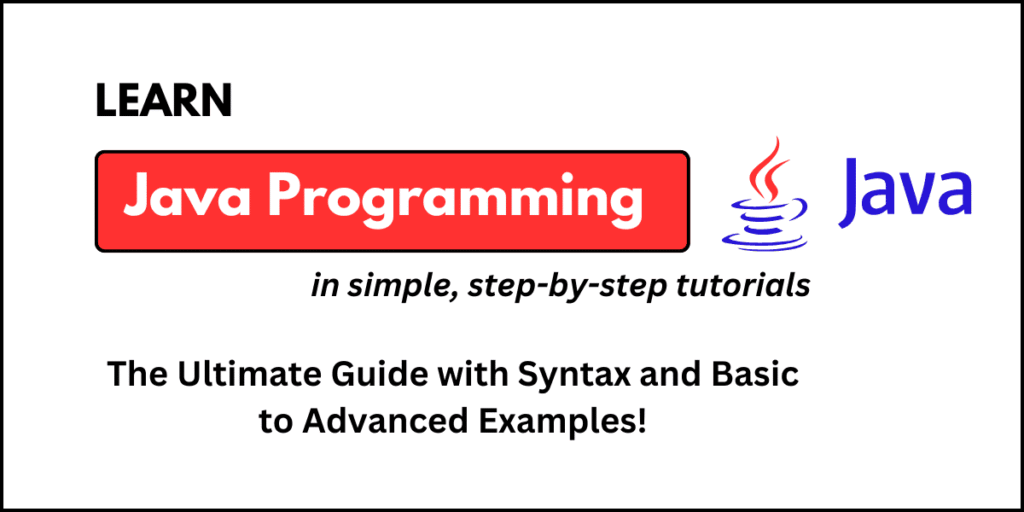This Java tutorial has been designed for beginners to advanced learners who want to master Java programming. Our experienced Java faculty has explained each concept with practical examples in simple and easy-to-understand steps. All Java tutorials at InfitechX have been carefully prepared and reviewed to ensure they are highly useful for students and aspiring Java developers.
Whether you are a school student taking your first steps into coding, a college engineering student preparing for exams and placements, or a working professional looking to upgrade your skills, Java is one of the best programming languages to begin with.
After following the Java tutorials one by one, you will find yourself at a solid, intermediate level of Java programming—from where you can confidently move on to more advanced concepts.
You can start learning Java from the basics—such as class, objects, variables, data types, and operators—and progress toward advanced topics like multithreading, collections, frameworks, and real-world projects. Each topic includes examples, explanations, FAQs, and quizzes to make your learning interactive and exam/interview ready.
So, whether your goal is to score high in exams, crack coding interviews, or build a successful career as a Java developer—this tutorial will guide you from zero to hero in Java programming.

Getting Started with Java
Explore the basic topics to get started learning Java programming:
- What is Java
- Basic and Fundamentals of Java
- What is Class in Java
- What is Object in Java
- New Keyword in Java
- Structure of Java Program
- Hello World Program in Java
Java Basics
Explore the basic topics such as primitive and non–primitive data types, variables, etc.:
- Primitive Data Types in Java
- Non-primitive Data Types in Java
- Java Variables
- Local Variables in Java
- Instance Variables in Java
- Reference Variable in Java
Java Operators
Explore the basic operators used to perform mathematical operations:
- Operators in Java
- Assignment Operators
- Relational Operators
- Logical Operators
- Unary Operators
- Bitwise operators
- Ternary Operator
- InstanceOf Operator
Java Conditional Statements and Loops
Furthermore, you can explore conditional statements and loops in Java programming to implement logic and make decisions based on specific conditions.
Frequently Asked Questions about Java Tutorial
Here, we have provided answers to some frequently asked questions (FAQs) about Java programming that beginners search on Google.
1. What is Java?
Java is a popular, high-level, object-oriented programming language used to build desktop applications, mobile apps, web applications, games, and enterprise solutions. It is known for its simplicity, security, and platform independence.
Sun Microsystems originally developed and released Java in 1995. It is currently owned by Oracle, and more than 3 billion devices run Java. Java runs on a wide range of platforms, such as Windows, macOS, and various versions of UNIX.
2. Why should you learn Java?
Beginners learn Java because of the following reasons:
a) Free and open source
b) Strong community driven and expert leadership.
c) Fast and high-performance
d) Easy to learn.
e) Statically typed language
f) Object-oriented programming language
g) Also supports functional programming
h) Widely used and high in-demand
i) Provides strong career opportunities.
j) Helps in learning other languages like Python, Kotlin, and C#.
3. Is Java easy for beginners?
Yes, Java has a clean syntax, strong documentation, and a huge community, making it one of the easiest languages for beginners to start programming.
4. How much time will it take to learn Java?
If you are a beginner, you can learn the basics of Java in 2 to 4 weeks. Intermediate concepts usually take 1 to 2 months, and advanced topics may take 3 to 6 months to master. The actual time varies based on your practice and consistency.
5. Do I need programming experience to learn Java?
No. Anyone can start learning Java from scratch—even without previous programming knowledge.
6. What are the prerequisites to learn Java?
You only need basic English reading ability, logical thinking, and a computer with Java installed. No advanced math or prior coding knowledge is required.
7. What software do I need to start Java programming?
You need JDK (Java Development Kit), IDE like IntelliJ IDEA, Eclipse, or NetBeans. You can also use a simple code editor like VS Code or Notepad++.
8. Can Java run on any operating system?
Yes. Java follows Write Once, Run Anywhere (WORA), meaning the same program runs on Windows, macOS, and Linux without changes.
9. What are the basic topics to learn in Java?
Beginners start with classes, objects, variables, data types, operators, conditional statements, loops, arrays, methods, and OOP concepts.
10. Is Java good for placements?
Yes. Many companies ask Java questions in interviews, and it is widely used in backend development, Android, automation testing, and enterprise applications.
11. What can I build using Java?
You can build web applications, android apps, desktop software, games,
enterprise systems, cloud-based apps, and big data solutions.
12. Is Java still in demand in 2025 and future?
Absolutely. Java remains one of the most in-demand languages for backend development, enterprise solutions, Android apps, and system software.
13. Which is better to learn first: Java or Python?
Both are good. Java is best for strong programming fundamentals, OOP, and enterprise-level jobs, while Python is best for beginners, data science, and AI. If your goal is software development or Android development, Java is the better choice.
14. Can I learn Java for free?
Yes. You can learn from:
a) Free tutorials (like InfitechX or Scientech Easy)
b) YouTube videos
c) Online documentation
d) Practice websites like HackerRank.
15. What is the best way to learn Java fast?
Follow tutorials step by step
Practice daily
Build mini-projects
Solve coding exercises
Learn OOP deeply
Work on real-world apps